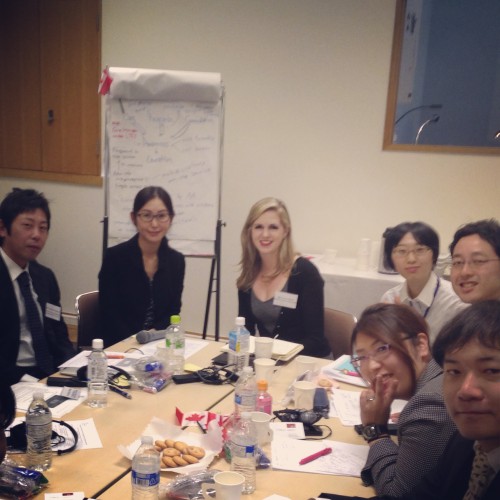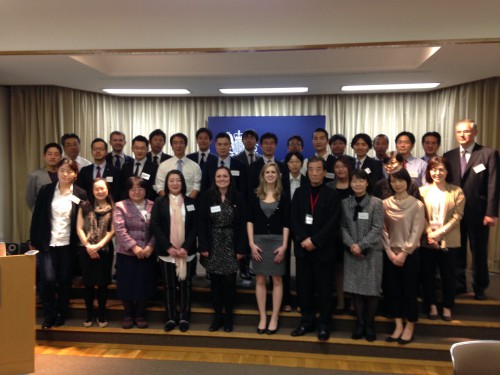17th February 2015 Montreal, Canada
Global Young Leaders in Dementia: Japanese Event
Again I am not taking credits for this blog. SIN Canada organised the 1st youth event on the 10th September (immediately before the Global Action Against Dementia Legacy Event- GAADLE) to discuss Dementia at the British High Commission. We facilitated the attendance of two Canadian young leaders (Laura Booi and Felicia White) to the Japanese youth event and GAAD LE in Tokyo. Therefore, this blog describes the experience of these two young ladies.
On November 6th 2014, Felicia White (Alzheimer Society of Ontario) and Laura Booi (PhD Candidate, Simon Fraser University) participated and assisted in facilitating the Japanese Young Leaders in Dementia Event held in Tokyo. These 34 young Japanese innovators were drawn from different sectors (e.g. start-ups, social innovation, engineering, economics, research, public health, communication, law and application designers) and were asked to come up with creative and innovative ideas covering diverse sectors, ranging from technology to urban design, and addressing the priorities defined by the World Dementia Council. This event is one of three events for young leaders in dementia occurring satellite to the Global Action Against Dementia Legacy Events established by the World Dementia Council and the UK’s Prime Minister, Mr. David Cameron.
This exciting day began with presentations from a key player in the Global Action Against Dementia Legacy Events. Sir Mark Walport, the UK Government’s Chief Scientific Advisor spoke to us about how we are the future of dementia solutions and how important our innovations will be to have understand and care for those with dementia. He emphasized that not much has happened in the way of dementia solutions in the last two decades and that it is now up to us to be the innovative, young voices at the table. We all could not agree more and we are ready for this challenge.
The young leaders’ discussions focused around three main themes: care, research and communication. Our conversations about care focused on the importance of understanding both the needs of the person with dementia as well as the needs of their care providers. We discussed the need for adequate dementia education for health care providers working with this population. Our discussions around dementia research highlighted the need for measuring effective outcome relating to the dementia trajectory. We also discussed the importance of qualitative research and the dementia narrative and the need to highlighting that there is life after a dementia diagnoses. Our discussions about communication emphasized implementing dementia education at an early age, beginning during primary school. If we can teach the youngest members of our population about dementia we are equipping, both their families as well as future generations, with the knowledge needed to create supportive and educated communities.
We are both thrilled to have had the opportunity to participate in the Japanese Young Leaders in Dementia event. We are excited to see what happens during the next Young Leaders Event which will be taking place in Washington D.C (February, 2015). The outputs and recommendations from the four Young Leader events will result in a declaration of principles that will be presented, as a youth perspective at the first World Health Organization Ministerial Conference on Global Actin Against Dementia Event (March, 2015). Our generation has a responsibility to be active participants in global action for dementia solutions. It is time we give this disease our full attention and that room is made in these global discussions for younger, innovative voices to be heard.


